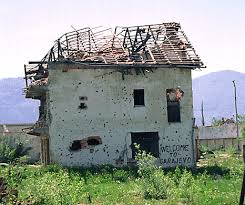记忆方法
音:猴窝,猴屋;音:后屋,前屋很大很宽畅,后屋是茅舍
2. 谐音“好窝、好屋哦”。
2. 谐音“好窝、好屋哦”。
中文词源
hovel 简陋的住所
来自古英语hof,围栏,居住地,屋子,来自Proto--Germanic*hufa,小山,农庄,来自PIE*keup,弯,转,词源同hive,cubicle,cooper.引申词义简陋的住所。
英语词源
- hovel (n.)
- mid-14c., "roofed passage, vent for smoke," later "shed for animals" (mid-15c.), of unknown origin. Meaning "shed for human habitation; rude or miserable cabin" is from 1620s. It also sometimes meant "canopied niche for a statue or image" (mid-15c.).
权威例句
- 1. I went for a living-in job, but the room I was given was a hovel.
- 我找了份提供住所的工作,但分给我的房间简直不是人住的地方。
- 2. They lived in a squalid hovel for the next five years.
- 接下来的5年中,他们住在一间肮脏不堪的小破屋里。
- 3. It's very uncomfortable living in a dirty hovel like ours.
- 住在我们这样肮脏的破屋子里,太不舒服了.
- 4. She's back in the old hovel already.
- 她已回到原来的破屋里去了.
- 5. I don't know how you can bear to live in this hovel.
- 我不知道你怎能忍受住在这狗窝里.

